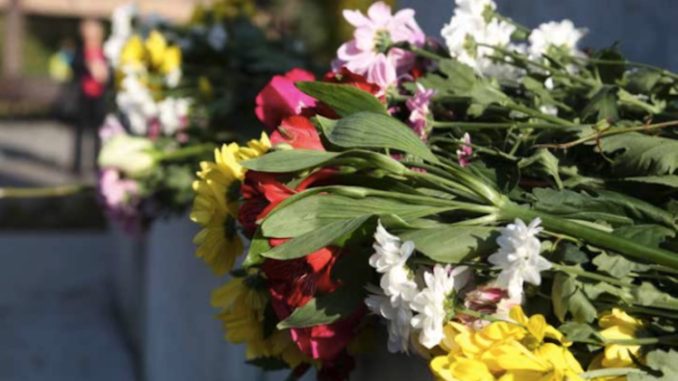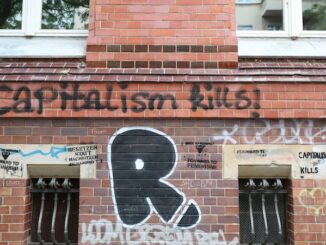
The failure to prevent the Christchurch attack is a collective one, writes Dr John Battersby of Massey University’s Centre for Defence and Security Studies.
It is a horribly uneasy and uncomfortable feeling to review one’s own work of not so long ago and see in it foreshadowed some of the reality of recent events. This was very much the feeling I had when I read my article “Countering terrorism where there is no terrorism to counter” in the Winter 2018 issue of Line of Defence. It is a heavy hearted pen that is now compelled to amend that title to the one that heads this piece.
It is indeed the case that those responsible for our national security were acutely aware than if an event, such as the Christchurch attack, was to occur that they would be challenged about why they didn’t see it coming or why they failed to prevent it. Within hours of the 15 March attack precisely those questions were asked and the event described as an ‘intelligence failure’.
Outside the Deans Avenue mosque thousands of people came in the hours and days following the atrocity that occurred there, their quiet, subdued and respectful demeanour exuding a collective solemnity that powerfully underscored the enormity of that failure. I was there the day after, and watching it, and feeling it, left me in no doubt there had indeed, been a massive and tragic failure.
But it is a failure not to be sheeted to a small section of our law enforcement and intelligence community, it is a failure we all share a part in causing. We have for far too long assumed that we had not previously been affected by terrorism.
It is clear that a careful review of New Zealand’s past events from 1970 showed the reality of lone actors prepared to use violence or the threat of violence to articulate political or religious ideological messages. Yet we didn’t remember them, we didn’t take the lessons out of them that were there. We have never adequately legislated for terrorism at any point in our recent history and we still have not.
New Zealand has previous examples of lone actors legally acquiring arsenals of weapons, and of mass killings. These are few and far between but they are there, and the fact that there have been clear inadequacies in our Arms Act since it was passed in 1983 has been raised by many.
No significant changes have been made to our Arms legislation since, and consequently we allowed the Christchurch offender to legally arm himself with multiple military style weapons designed to kill volumes of people. He demonstrated how effectively we succeeded in letting him do this.
We have for far too long believed that our geographical isolation has insulated us from terrorism. We have had safe and distant seats observing the global rise of modern violent extremism over the past 20 years. We have watched the internet and social media eliminate geography and distance as factors affecting the terror-scape and yet we continued to believe that we were immune.
As a society, we genuinely believed that the absence of modern terrorism here was because we were too good, too caring, too laid back and too far away. The mass murder of 15 March hideously exposed the fact that we are not. The perpetrator streamed his assault as an audience around the globe watched, some cheering him on. We are not some distant land too far for terrorists to notice – cyberspace has placed us in Europe, Asia, Africa and the Americas. Our 9/11 has now come. The possibility that it would come, has existed for some considerable time.
Enjoying this article? Consider a subscription to the print edition of Line of Defence Magazine.
Inevitably there will be a torturous process of establishing how the 15 March attacker planned his attack. In hindsight, with the outcome now certain, critics will retrospectively spot the ‘flags’ that could have alerted security agencies to the fact this man was a clear and present risk which should have been acted on. Allegations have been made that security eyes were focused in the wrong place – on violent jihadism instead of right wing extremism, which on the face of it, looks like a possibility.
But predicting events that have already happened is easy, and proving how they came to occur a lessor challenge than positively identifying what might happen amid the myriad of possibilities that exist ahead of time.
Watch lists of possible perpetrators are kept, targets investigated and assessed, and a small number of individuals here have been intercepted probably prior to committing any serious crime. They have appeared in court on various lesser criminal charges. In preventing a grievous outcome however, is the elimination of any proof that any such thing would have happened. The success of our security sector will go unheralded here.
Watch lists work. But they do not work all the time. Most people on them never commit any crime; some do but are not stopped because the ‘flags’ just don’t fly high enough. Some, like the Orlando offender, are taken off watch lists and offend anyway. Others, like the Lindt Cafe perpetrator in Sydney, were actively being watched, but still their rapid decision to act caught police unawares.
On information available so far, the Christchurch perpetrator simply didn’t raise flags in Australia or New Zealand, has no criminal history, and many people who knew him saw no sign of his extremism. A number endorsed him in 2017 as a fit and proper person to hold a firearms license. He should have been on a watch list and he should have been stopped, but it’s the known outcome that now makes this obvious…. it’s a more difficult task when there hasn’t yet been an outcome.
Terrorist organisations with long term goals and plans to run campaigns of repeated violence generate logistical, communications and planning footprints. Security agencies see the patterns and connections in these and can be in a position to counter them. Lone actors or small cells, with tight and small organisational networks, with the sole objective of carrying out just one attack, are far more difficult to see and identify. It is more difficult to be sure about the need to interdict.
The Christchurch offender has not finished; he gave himself up. He wants the world stage a court room will give him. His trial must be full and fair, but to counter his terrorism it needs to be a closed court, without media to repeat and amplify his twisted message. I have deliberately not named him. I will not remember him or allow him ‘credit’ for what he did.
Over coming weeks and months we will look for answers in the fine detail, we look to identify whose responsibility it was to get in front of the Christchurch perpetrator and prevent him from committing his massacre of innocent people. Someone, or some security sector group, will be blamed perhaps, but ultimately we all share responsibility for this.





